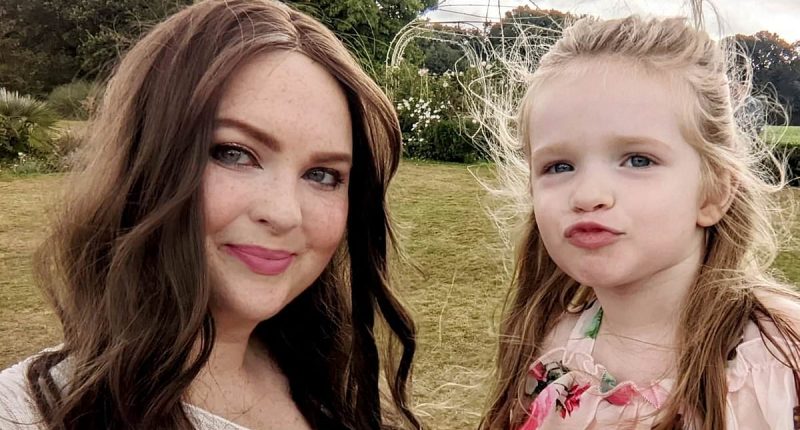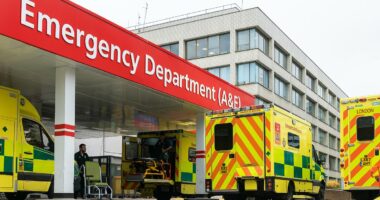Share this @internewscast.com
A mother-of-one with just weeks to live has warned women not to dismiss the potential early signs of breast cancer, after mistaking a symptom of the killer disease for a common injury.
Lisa Foster, 32, from Hampshire, went to her GP after discovering a pea-sized lump in her left breast which she initially thought was from exercising too rigorously in June 2023.
But, when the lump hadn’t gone down a week later, Ms Foster was referred to hospital for further tests.
There a biopsy confirmed she had stage three triple-negative ductal sarcoma.
According to Breast Cancer Now, this type of breast cancer is a rare but more aggressive and harder to treat form of the disease.
Mrs Foster was told that she would need a mastectomy to remove her breast and a range of intense therapies in a bid to treat her cancer.
After months of treatment Mrs Foster was set to undergo another scan to see if she was well enough to start radiotherapy––which uses high energy x-rays to destroy cancer cells.
But shortly after the family were given the devastating the news the disease had spread to other parts of her body and was now in the advanced final stages.

Lisa with her husband Adam and their daughter who is now four years-old

Breast cancer is the UK’s most common cancer with almost 56,000 cases diagnosed per year

Lisa now wants to raise awareness of red flag symptoms you should never ignore before she dies and is urging women to check their breasts for any changes
‘She wasn’t well enough––the cancer had spread to her chest wall, her right breast and her liver,’ her husband Adam, 31, recalled.
‘We were told she was now stage four.’
Only about one in four women with stage four breast cancer are expected to survive for five years or more following their diagnosis.
While incurable, stage four breast cancer can still be treated and this can extend a patient’s life for months, and even years.
Unfortunately, despite trying four different treatments, including a drug trial, Mrs Foster was told this month that her next round of chemotherapy has just a 9 per cent chance of working.
Medics have now said she has only about ‘two weeks’ to live.
In a heartbreaking post on social media, she wrote: ‘Unfortunately, my liver is failing me and I’m not sure how long I have got left to live.’
She added: ‘The cancer hasn’t won the fight. It dies with me and I will fight for as long as I can.’

Lisa met her husband when she was just fifteen years old, and now at just 32 she has been given just two weeks to live
Speaking today, Mr Foster said the family wanted to highlight Lisa’s story in an attempt to help other women and urge them to check their breasts regularly for any changes.
‘We want people to know that cancer can affect anyone at any age––Lisa is a young mum who thought she just had a gym injury.’
‘We are all devastated,’ he added said. ‘She is such a kind-hearted person, and the world’s going to be a bit darker without her.
‘Lisa and I have been together a long time––we met when we were 15.
‘I don’t want to imagine what things will be like when she’s gone.’
Her friend Becky Bailey has set up a GoFundMe page to help with the cost of the funeral, which has already raised almost £5,000.
Paying tribute to Mrs Foster she said: ‘It just goes to show that Lisa has touched the lives of every single person she’s met.
‘She is bubbly, funny, such a ray of sunshine, even her oncologist would book her appointments at the end of the day in case they needed cheering up.’

Lisa is now in the end stages of her triple negative breast cancer journey and hopes that her story will inspire other women to get checked

Symptoms of breast cancer to look out for include lumps and swellings, dimpling of the skin, changes in colour, discharge and a rash or crusting around the nipple
Mrs Foster is one of an estimated 61,000 women in the UK living with secondary breast cancer, a figure that’s been rising year on year.
An estimated 1,000 patients die from the disease every month in Britain—the equivalent of one death every 45 minutes.
Survival rates for the cancer depend on what stage it is diagnosed, but, overall, three out of four women are alive a decade after their diagnosis, with survival rates having doubled in the last 50 years alone.
Mrs Foster’s plea comes as millions of women in England could soon be offered breast cancer checks as young 30-years-old.
Currently all women are aged between 50 and 70 are invited for screening every three years, with the first invitation between the age of 50 and 53.
But every year, more than 10,000 British women who are too young to be offered a check are diagnosed with the disease, with 2,000 deaths among those below the age of 50.
Now, a groundbreaking new trial has found almost one in five women tested in their thirties have an increased risk of developing breast cancer.
Dr Sacha Howell, a consultant at the world-renowned Christie hospital in Manchester who led the study, said all women should now undergo a ‘comprehensive risk assessment’ from the age of 30.
One in seven women in the UK are diagnosed with breast cancer in their lifetime with around 56,000 cases a year—making it the most common cancer in the UK.
The figure stands at roughly 300,000 annually in the US. Overall, around 85 per cent of women diagnosed with breast cancer survive more than five years.
Whilst anyone can develop breast cancer, it is not always clear what causes it.
Women over the age of 50, who have dense breast tissue, have breast disease or have family members who have had breast or ovarian cancer, are at a higher risk of the disease.
To help catch cancer early, the NHS advises going for breast screening to help reduce the risk of the disease becoming fatal.
Making lifestyle changes such as cutting down on alcohol, losing weight if you’re overweight or obese, and quitting smoking will all lower your chance of getting breast cancer.
Women are also encouraged to check their breasts regularly for potential signs of the cancer.
These include a lump, or swelling in the breast, chest or armpit, a change in the skin of the breast, such as dimpling or redness and a change in size or shape of one or both breasts.
Nipple discharge with blood, a change in the shape or appearance of the nipple and continuous pain in the breast or armpit are also signs of the deadly disease.
While these are not always a cause for concern, anyone who experiences these symptoms is advised to consult their GP.















